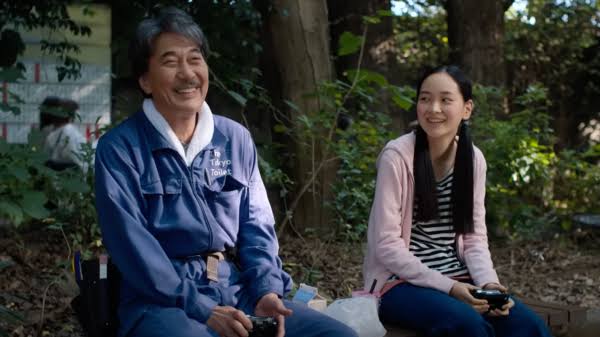As the saying goes: When life gives you lemon, make lemonade. That’s exactly what Hirayama, a toilet cleaner in Tokyo, does.
The movie Perfect Days, a Japanese-German co-production directed by German director Wim Wenders, features the day-to-day life of an introvert, who does nothing special with his life. He is content to be just ordinary.
For two hours, we witness the unchanging routine of Hirayama (Koji Yakusho). He wakes up in his poor, but clean apartment in a Tokyo suburb. He trims his moustache. He waters his plants. He puts on a blue overall. He hops into his van and inserts a cassette in the player. He listens to oldies by Lou Reed, Patti Smith, the Rolling Stones and others on his way to work. This music is one of his little pleasures, but is an important part of the film.
Hirayama cleans public toilets for a living. He scrapesthe rims of urinals, wipes mirrors, polishes taps and mops floors. During his break, he follows his passion for photography, snapping trees.
He seems indifferent to his work, but he is conscientious. For him, his work is merely a small part of his life. It does not ruin his life. Nor does it make him forget his passion.
Wenders, who wrote screenplay with Takuma Takasak,reveals little about Hirayama’s background. He does not create a neat plot. Rather, he presents life in its simplest form. Hirayama is single, friendless and rarely speaks, but he finds joy in every moment — he reads, listens to classical music and takes photos.
For all this, Hirayama is no saddo or weirdo deserving pity. His life is in no way dysfunctional. He is just an introvert with a shy smile. He sleeps comfortablysurrounded by piles of audio cassettes and books which he cherishes. At the weekend, he does his laundry, buys a new book and has his photos developed.
Hirayama is not interested in money. He does not want to change anything in his simple little world.
He does not want relationships. When a young girl becomes obsessed with his old cassette collection, he did not want to take the relationship any further. Even when his niece comes to stay with him, he is relieved when she goes back home.
The cinematography in Perfect Days is stunning, reflecting Hirayama’s world as very simple yet deep, with beautiful shots of Tokyo and the city’s vibrant energy and bustling streets and, of course, the well-equipped toilets.
The film is in Japanese with English subtitles, but dialogue is sparse dialogue yet Yakusho’s facial expressions alone speak volumes.
There is no plot. There are no turning points, yet Perfect Days captivates the viewer with tiny, emotional details until the final scene with Nina Simone’s song ‘Feeling Good’.
The movie, which will represent Japan in the Oscar 2024 as it is nominated for Best International Feature Film, is a must-watch as it will leave you reflecting on the complexities of life and the importance of finding joy in even the most unimportant moments.






Discussion about this post